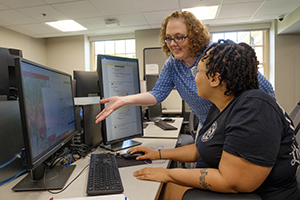Accessibility at Miami takes a leap forward with Ally

by Elizabeth Jenike, IT Services
Miami’s commitment to accessibility and universal design principles is no secret. We strive every day to create more accessible content, more inclusive spaces, and better paths forward for all of our students—no matter their journey.
When it comes to making content accessible—which has been shown to have a positive impact on all students, not just those who have requested accommodations—it’s all about having access to the right information. Ally is a powerful new tool designed to help faculty meet students where they are. Ally is integrated with Canvas to provide insight on the accessibility of your course materials, and it quite literally puts the tools in your hands for improving that accessibility.

Ally's two main functions are to:
- Evaluate all documents that are uploaded to Canvas and, for those documents which do not comply with accessibility guidelines, lead the instructor through the steps needed to improve the accessibility of the document.
- Provide students with alternative formats of the original document so they can select the one that best fits their unique needs.
You may have noticed it in your Canvas courses already. The red, orange, and green gauges indicate how accessible your course content is.
Ally will help you convert your documents into different formats that meet the needs of different students. Please note that the quality of the conversion depends on the quality and formatting of your original document. Text-only documents therefore offer the best original format. Documents less suited for conversation are those with non-textual content (e.g., scanned images of STEM content, complex mathematical equations, and graphs).
Our pilot of the Ally software has demonstrated that all students can benefit from increased accessibility in course content. For instance, some students have indicated that they prefer to listen to an audio version (MP3) of longer documents while driving or when their eyes are tired. This empirical example is in line with what we already know: Accessibility isn’t just about providing accommodations to those who have requested them; it’s about listening to all students and meeting them where they are—creating accessible content for everyone.
More information about Ally and how to use its insights effectively in Canvas can be found at our website: MiamiOH.edu/Ally.
Follow along on Twitter and Instagram for more information about Ally in the coming weeks. Stay tuned for tips, tricks, and best practices!

